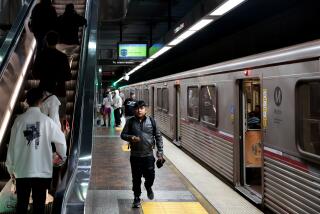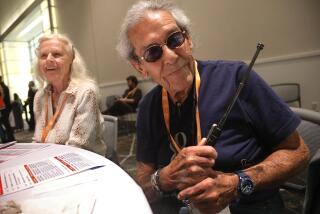Atlanta Guard Trusts Instinct in Bomber Hunt
- Share via
ATLANTA — About 180 feet below Peachtree Street in the heart of the city, a trio of cellists from the Atlanta Youth Symphony is playing Brahms and thousands of bag-toting visitors are floating down long escalators to the train platform when Wesley Tillman spots a man who might be the person he’s been seeking all his professional life.
Two days after a terrorist bomb exploded three blocks away, that search has never seemed more urgent.
“I’ll just check this out,” Tillman, 48, a major with the Metropolitan Atlanta Rapid Transit Authority, says. The man who has gotten Tillman’s attention about noon Monday is young, tall and brown-haired. Like almost every other tourist in town for the centennial Olympic Games, he is wearing shorts and a white T-shirt and carrying a small nylon bag.
Minutes earlier, the man had boarded and then quickly gotten off a rapid transit train, then left the station. Now he has returned.
Tillman, in a dark blue uniform, a 9-millimeter automatic pistol holstered on his right side, hustles down the moving stairs and within seconds is standing beside the man, making eye contact, gauging the stranger’s reaction, evaluating his body language. The passenger makes a comment about the wait and checks his watch.
Tillman lingers, then makes his way back up the escalator. “I didn’t make him nervous,” he says after returning to his perch overlooking the hubbub below. “But I wanted to clear something up in my own mind. That guy was OK. But he is out there.”
The “he” that Tillman and every other law officer and security agent in this vulnerable, edgy city is looking for is not necessarily the person who planted the pipe bomb that exploded early Saturday in Centennial Olympic Park. Rather, says Tillman: “He’s anybody, of any age, any sex, any race, and I’m looking for him every day. And I just hope I can spot him before he does anything.”
Midway through an international spectacle that already has been tainted with one act of terrorism, perhaps nothing could seem more inviting to a sower of hysteria than a 46-mile transit system, a third of which moves inside tunnels cut through solid granite. Last year similar systems in Tokyo and Paris were targeted. Another third of the Atlanta transit system runs on elevated track.
On Friday, more than 1 million passengers moved through the system, the largest single-day total in its 17-year history. “We have always said that it would be impossible for us to operate a transit system like an airport,” says Richard J. Simonetta, general manager of the transit authority. “We cannot search everyone.”
What can be done--and has been done--is bring in 200 extra police officers, most from federal agencies as far away as Los Angeles, to supplement the transit authority’s regular force of 300. Armed officers wearing vests marked “POLICE” patrol the platforms, watching for suspicious persons, eyeing all hand and shoulder bags, guarding the tunnel entrances. In each of the authority’s 39 stations, trash containers are emptied every 20 minutes. The locks on doorways to work areas are checked regularly. Police have conducted mock evacuations of the stations, using hundreds of volunteers as travelers.
Still, admits Simonetta, “this is a very public space. We are like the park. Now, I’m thinking, someone out there saw an opening. Now us? Is that person thinking: ‘Where else can I do some damage? Where can I hurt some people?’ Because that bomb was intended to hurt people.”
Tillman is determined that no one will be hurt in the Peachtree Center station while he is in charge. As trains pull into the station at six-minute intervals, Tillman takes in the cast-of-thousands ballet: the vertical movement of people on the stairs, the flow of others in and out the doors of the train, the sure, quick steps of the watchful officers patrolling the lip of the platform by the track.
In halting English, the people he calls his customers approach to ask directions. “South to Five Points, then take the east line,” he cheerfully tells one Asian couple looking for Georgia State University.
Tillman says there is no particular profile of a potential terrorist. But as he returns his attention to the crowd, he explains: “I look at the people, the way they act, the way they handle the bags. Are they carrying the bag gingerly? Are they looking around at police?
“Do they have something in their eyes that says they have something in their mind?
“A police officer’s instincts are his best tools, along with training and ability. I tell my officers: ‘Don’t second-guess your first impression.’ If you see someone who makes you curious, move toward him. See if he becomes nervous, perspires. Walk around the person. See if he follows you or speaks. Find out if there is something that confirms your suspicion.”
Tillman, an Atlanta native and grandfather of three who was a city police officer for 13 years before joining the transit authority in 1980, says that--despite the park bombing--he believes “the tourists are not going to let anything stop their enjoyment of the Olympics.”
“This is testing us,” Tillman says. “But we’ve handled big crowds before, and I don’t feel any more pressure because of the bombing. I especially don’t want anything to happen on my watch. But if it does, I’m here. I’m ready to handle it.”
More to Read
Sign up for Essential California
The most important California stories and recommendations in your inbox every morning.
You may occasionally receive promotional content from the Los Angeles Times.













